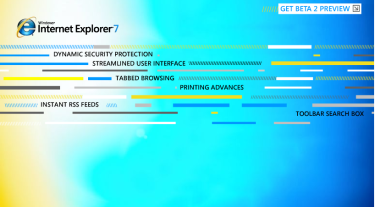IE7 isn't an Edge Case - but will win over the masses

I've been tracking reactions to Microsoft's IE7 Beta 2 Preview. In my first post IE didn't get 80% of the browser market by being on the edge I pointed to some of the initial reviews around the Web, which seemed to be mostly positive. I was interested to read what ZDNet readers had to say and mostly it was along the lines of: IE7 is OK, but I'll stick with Firefox. One person called it "a huge improvement" (but is still sticking with Firefox), another had tested it for a day and half and said it "seems pretty good so far", another said "it's stable, works fine [but] really wasn't worth the anticipation". Some found bugs - e.g. snharden said that "after first downloading it. It was pretty good. Now going on day 3 and problems are creeping in." But others found IE7 to work fine - e.g. Cayble stated "...I have pushed this thing around the internet for a few days now and its ticking along almost as if it was a finished product. "

Of course, the target audience for IE7 won't be techies or even Webheads like me (and yes I do use Firefox and will continue to do so). IE7 is aimed squarely at the masses - and it's things like RSS integration which will, in the final analysis, have the most impact when the product is released. As Jeff Nolan wrote, referring to the RSS aggregation aspects of IE7:
"IE7 features are hardly “impressive” but they are certainly integrated, which will be enough for many people to switch from independent aggregators, so they only have to use one application."
Matthew Ingram put it more bluntly, in a post entitled "Hey bloggers — MSFT doesn’t care about you". He notes:
"We can keep on using Firefox and Performancing and Greasemonkey and all those great things, but the fact is IE still has 80 per cent of the browser market, and it got that way by not being on the edge."
Still, it's interesting to look at how IE7 shapes up technically. Firefox developer Asa Dotzler seems to be fairly impressed, although as you'd expect he uses Firefox as the yardstick to which IE is finally living up to:
"There's no doubt in my mind that the IE 7 project is a direct result of the work we've done to provide people with a better web experience through Firefox, and IE's inclusion of Firefox features, from tabbed browing, to web feed (RSS and others) support and pop-up blocking, is a validation of the pioneering, user-focused work we've done in building Firefox."
All and all then, Microsoft will be pleased with the mostly positive reviews of IE7. Current Firefox users will stick with the Firefox browser - and I'm certainly in that camp. But the masses are probably in for a nicer browsing experience, once IE7 is released and the PC/OS upgrade cycle begins anew.